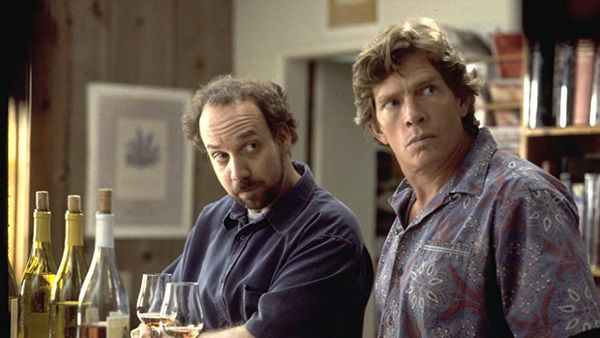Eye For Film >> Movies >> Sideways (2004) Film Review

It's time to hear it for the underdog. Who needs fame when it only reminds the moaning multitudes that their lives are as memorable as piss stains in the snow?
"I'm so insignificant, I can't even kill myself," Miles (Paul Giamatti) confesses. A middle school English teacher from San Diego, with an encyclopaedic knowledge of wine, he has "been officially depressed for two years." When his wife left him, that was it. He settled into a permanent state of negativity, blaming her when he could be bothered and generally basking in self-pity, as if this was his comfort blanket against the bitter truth. "Half my life is over and I have nothing to show for it." Right!

Jack (Thomas Haden Church), on the other hand, is an addictive optimist. A Hollywood actor, arriving at the back end of 40 without ever having understood the meaning of the word "introspection", he is still trading - does this explain why waitresses wet themselves in his presence? - on the notoriety of having played a doctor in a TV soap. When he flashes his 100-watt smile and switches into babecruise mode, the ladies find resistance a less entertaining option than going with the flow. Miles looks appalled: "You're an infant, Jack."
In the spirit of a road movie, these two unlikely friends travel through the Californian wine-growing district, taking a week's vacation before Jack's impending nuptials. Miles wants quality time with the grapes, while Jack wants to get laid.
What might have degenerated into American Pie: The Crusty Years remains faithful to itself. The performances are sublime, not only from Giamatti and Church, but also Marylouise Burke, as Miles's mom, and the two en route squeezes, Virginia Madsen and Sandra Oh, who appear tentative and pliant at the same time.
The writing is consistently intelligent and even if the moral boundaries are breached with careless abandon, there is no feeling of irresponsibility towards the concept of wild oats. While Miles questions the foolishness of taking Jack anywhere, especially to his beloved vineyards, Jack sympathises with his friend and encourages the recuperative powers of sexual healing.
Where writer/director Alexander Payne wins hearts and minds is by remaining loyal to his characters. He neither mocks them, not praises them. He lets them be and, in doing so, they mock themselves.
Reviewed on: 29 Jan 2005




















